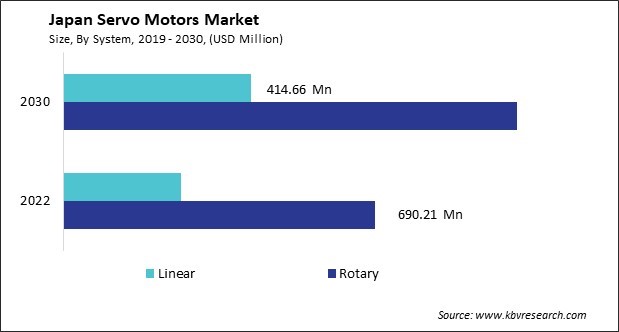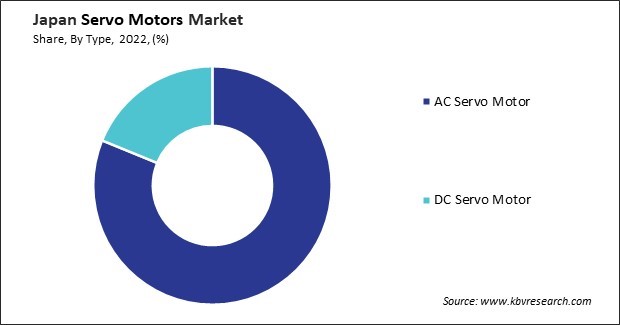The Japan Servo Motors Market size is expected to reach $1.4 billion by 2030, rising at a market growth of 5.0% CAGR during the forecast period.
The servo motors market in Japan holds a significant position within the country's industrial landscape, playing a crucial role in various sectors. With Japan's reputation for technological innovation and advanced manufacturing capabilities, the servo motors market reflects a dynamic and competitive environment driven by evolving industry demands and technological advancements. Japan's strong focus on precision engineering and quality control has propelled the servo motors market to prominence. Japanese manufacturers have established themselves as leaders in producing high-performance servo motors renowned for their reliability, accuracy, and efficiency.

One key driver of the servo motors market in Japan is the robust demand from the automotive sector. The growing trend towards electric vehicles (EVs) and autonomous driving technologies is expected to fuel additional demand for servo motors in the automotive industry. According to the Japan Automobile Dealers Association (JADA), sales of new electric vehicles in 2020 reached close to 1.4 million. Japan's renowned automotive manufacturers, including Toyota, Honda, Nissan, and Mitsubishi, heavily rely on servo motors to maintain high productivity levels and precision in their production lines.
Moreover, the COVID-19 pandemic has significantly impacted the servo motors market in Japan. The pandemic disrupted supply chains, caused production slowdowns, and led to fluctuations in demand across various sectors. While some industries, such as healthcare and e-commerce, experienced increased demand for automation solutions, including servo motors, to support essential operations, others, such as automotive and manufacturing, faced challenges due to reduced consumer spending and factory shutdowns. However, the crisis also accelerated certain trends in adopting automation and robotics as companies sought to enhance resilience, flexibility, and productivity in response to the pandemic's disruptions.
In recent years, Japan has witnessed a significant surge in the demand for industrial robots in the servo motors market. Industrial robots with servo motors offer precise control and high-speed operation, enabling manufacturers to streamline production lines, reduce cycle times, and enhance overall output quality. Advancements in robotics technology, particularly in developing more compact, energy-efficient servo motors, have made industrial robots more accessible and cost-effective for a wider range of applications.
One of the primary drivers of the increasing demand is the need for greater efficiency and productivity in manufacturing processes. According to the International Trade Administration, in 2022, 45% of all industrial robots in the world were originally produced or designed by companies in Japan. The remarkable growth in this industry was evident as orders for industrial robots from Japanese manufacturers achieved a record-breaking $7.35 billion, marking a 1.6% increase from the previous year. As Japan continues to face challenges such as an aging workforce and rising labor costs, automation solutions become increasingly appealing to businesses seeking to maintain competitiveness in the global industry.
Moreover, Japan's ongoing digitalization and Industry 4.0 initiatives are further accelerating the adoption of industrial robots integrated with advanced servo motors. Hence, the surge in demand for industrial robots equipped with servo motors in Japan is driven by the imperative for enhanced efficiency, productivity, and competitiveness.
The servo motors market in Japan has been experiencing a notable surge in the adoption of semiconductor technology, marking a significant shift in the industry landscape. One of the primary drivers behind this trend is the relentless pursuit of miniaturization and increased efficiency in industrial automation systems. With their compact size and high performance, semiconductor components have become integral to developing servo motors that deliver unparalleled precision and speed control.
According to the World Semiconductor Trade Statistics (WSTS), Japan's electronic products industry, the third largest in the world, is the most significant factor driving demand for semiconductor sales to Japan. The Japanese semiconductor industry grew to $37.4 billion by 3.9% in 2020. As industries across Japan seek to optimize manufacturing processes and enhance productivity, the demand for such advanced servo motors equipped with semiconductor-based control systems is rising. Moreover, the semiconductor industry's continuous innovation in materials and manufacturing techniques has enabled the production of servo motors with improved reliability and durability.
Furthermore, the integration of semiconductor technology has facilitated the implementation of sophisticated feedback mechanisms and sensor systems in servo motors. As a result, industries in Japan are increasingly turning to semiconductor-based servo motors to meet the stringent quality standards and precision requirements of modern manufacturing processes.
Additionally, the growing emphasis on energy efficiency and sustainability drives the adoption of semiconductor-enabled servo motors, which offer superior energy savings compared to traditional motor systems. This aligns with Japan's broader initiatives to achieve environmental sustainability and reduce carbon emissions in industrial operations. Thus, the surge in the adoption of semiconductor technology is revolutionizing the servo motors market in Japan, which is driven by demands for miniaturization, efficiency, reliability, and sustainability in industrial automation.

The servo motors market in Japan is a pivotal segment within the nation's thriving manufacturing and automation industry. One of the prominent companies in the Japanese servo motors market is Fanuc Corporation. Fanuc is a global leader in factory automation, robotics, and CNC systems, with servo motors being a crucial component of its product portfolio. The company's servo motors are known for their exceptional precision, speed, and durability, which are ideal for industrial robots, machine tools, and other automated systems. Fanuc's commitment to innovation and continuous improvement has solidified its position as a preferred supplier of servo motors not only in Japan but worldwide.
Yaskawa Electric Corporation, headquartered in Japan, is also a major player in the country's servo motors market. The company is renowned for its expertise in motion control, robotics, and automation solutions, with servo motors integral to its product offerings. Yaskawa's servo motors are synonymous with precision, efficiency, and versatility, serving various industries, including automotive, electronics, food and beverage, and logistics. The company's commitment to research and development ensures that its servo motors remain at the forefront of technological innovation, enabling customers to achieve higher levels of productivity and performance.
Another significant player in the Japanese servo motors market is Mitsubishi Electric Corporation. Mitsubishi Electric is a diversified multinational conglomerate with a strong presence in various industries, including industrial automation and motion control. The company's servo motors are widely acclaimed for their high performance, reliability, and advanced features, catering to various applications such as packaging, printing, semiconductor manufacturing, and robotics. Mitsubishi Electric's extensive experience and technological expertise enable it to deliver servo motor solutions that meet the stringent demands of modern manufacturing environments.
Panasonic Corporation is another notable participant in the Japanese servo motors market. The company is a diversified electronics company with a significant presence in industrial automation, robotics, and motion control systems. Panasonic's servo motors are renowned for their reliability, compact design, and energy efficiency, making them suitable for various applications, from factory automation to consumer electronics. The company's comprehensive range of servo motors caters to the evolving needs of industries seeking precise and reliable motion control solutions.
Additionally, companies such as Omron Corporation, Hitachi, Ltd., and Toshiba Corporation play significant roles in Japan's servo motors market, leveraging their expertise and resources to develop innovative solutions that drive automation and productivity. These companies specialize in various aspects of motion control technology, including servo motors, drives, controllers, and sensors, providing comprehensive solutions to meet the diverse needs of customers across different industries. As automation and robotics become increasingly integral to modern manufacturing processes, the demand for high-performance servo motors is expected to grow, presenting opportunities for Japanese companies to expand their industry presence further and contribute to advancing the global automation industry.
By System
By Type
By Application
Our team of dedicated experts can provide you with attractive expansion opportunities for your business.

